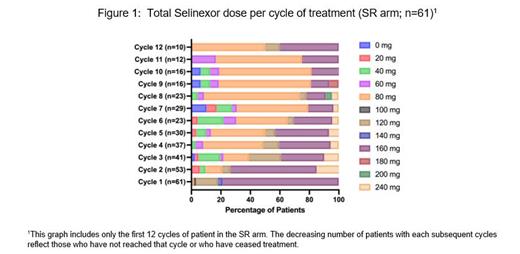Introduction:
Upregulation of Exportin 1(XPO1), a molecule that mediates nuclear export of tumor suppressor proteins, is associated with poor prognosis and resistance to immunomodulatory drugs (IMiD) and proteasome inhibitors in myeloma (MM). Selinexor (S) is an oral selective XPO1 inhibitor, that is approved in combination with bortezomib and dexamethasone to treat adult patients with MM who have received at least one prior therapy. We hypothesize that low dose S when combined with low dose lenalidomide (R) will be synergistic and will improve progression free survival (PFS) compared to R maintenance post autologous stem cell transplant (ASCT) in patients (pts) with transplant eligible (TE) newly diagnosed (NDMM). We report here the results of the planned futility analysis, after at least 30 patients had completed a minimum of 6 months follow-up in the phase III randomized SeaLAND (ALLG MM23) study (ANZCTR12620000291987).
Method:
Eligible pts were TE NDMM who have had 3 to 6 cycles of induction containing bortezomib (V), dexamethasone ± R. Registration occurred pre-ASCT; screening and randomization occurred from day 75 to 115 post-ASCT. Twenty pts in the lead in safety phase were given low-dose S [40mg (increased to 60mg from C2 if well tolerated) po D1,8,15,22] with R (15mg D1 to 21; 10mg in C1 to 3) in a 28-day cycle. Upon review by the independent safety committee in May 2023, after the first twenty pts had completed 2 cycles of SR, a starting dose of S of 40mg/week was deemed generally safe with no escalation recommended. Subsequent patients were randomized 1:1 to either SR (S capped at 40mg/week) or R. Primary objective was to determine 3-year-PFS; secondary objectives included safety/tolerability and additional efficacy measurements.
Results:
As of 30 May 2023, 117 pts (70% male) received maintenance (69 pts SR; 48pts R). 103 patients (61 SR and 42 R) had clean data at a cut-off date and were included in this analysis. Median (med) age was 60 (range 34-75). 27.4% of patients had high risk cytogenetics; ISS stage 1,2,3 occurred in 31.5%, 47% and 26.5%, respectively. Med follow-up for the overall group was 11.9 (0.3-28) months, with a med 10 (1-27) cycles [10 (1-27) SR; 9.5 (2-21) R] and 86.1% of patients continued treatment (83.1% SR; 90.7% R). All patients (n=103) had ≥ 1 treatment-emergent adverse event (TEAE); 64% grade (Gr) 3-4 (84% SR, 36% R); SAE occurred in 21% (28% SR, 12% R). Hematologic Gr 3-4 TEAEs were anemia (1.6% SR; 4.8% R), neutropenia (60.7 SR; 28.6% R) and thrombocytopenia (24.6% SR; 0% R). Gastrointestinal TEAE occurred in 50.4% of all patients (67.5% SR, 26.2% R). Diarrhea, nausea and vomiting in the SR (Gd 3-4)/R (Gd 3-4) group occurred in 26.3% (3.3%)/23.8% (2.4%), 57.1% (9.8%)/7.1% (0%), and 8.2% (1.6%)/0% (0%), respectively. The incidence of gastrointestinal TEAE in the SR group decreased from C3 onwards. Infections occurred in 41% of all patients (49% SR, 29% R); Gd 3-4 infections in 9 % (15% SR, 0% R). COVID-19 infections occurred in 16% (13% SR; 19% R), and all but one was Gd 1-2. 1 patient died (SR arm) due to progressive disease. In the SR group, the med RDI (relative dose intensity) of S was 66.7% (20.8-150%), and in the R group; the med RDI of R was 100% (33.3-100%). Most patients in the SR arm (n=61) tolerated S dose between 80mg (20mg per week) to 160mg (40mg per week), which remained consistent with time (figure 1).
Conclusion:
A dose of S 40mg weekly was generally tolerable when combined with R 10-15mg days 1-21 in a 28-day cycle, as maintenance therapy post ASCT. The safety profile was consistent with each of S and R individually. Recruitment in the ALLG MM23 (SeaLAND) study is ongoing and updated safety and treatment data will be presented at the meeting.
Acknowledgement: Patients, their families, and participating ALLG members and member sites. ALLG acknowledges the support of Karyopharm for funding and Selinexor supply.
OffLabel Disclosure:
Quach:Karyopharm: Consultancy, Membership on an entity's Board of Directors or advisory committees, Other: receipt of study materials, Research Funding; GSK: Consultancy, Membership on an entity's Board of Directors or advisory committees, Other: receipt of study materials; Leadership or fiduciary role, Research Funding; BMS: Consultancy, Membership on an entity's Board of Directors or advisory committees, Other: Leadership or fiduciary role; Sanofi: Consultancy, Other: receipt of study materials. Lasica:JanssenJanssen: Other: Education; Celgene: Other: TRAVEL, ACCOMMODATIONS, EXPENSES. Mollee:Cilag: Research Funding; Pfizer: Research Funding; Janssen: Research Funding. Sidiqi:Pfizer: Membership on an entity's Board of Directors or advisory committees; Janssen: Membership on an entity's Board of Directors or advisory committees, Speakers Bureau; Antengene: Speakers Bureau; Gilead: Speakers Bureau; BMS: Speakers Bureau. Renwick:Astra Zeneca: Research Funding. McCaughan:BMS: Honoraria; Janssen: Honoraria.
Selinexor used as maintenance therapy for Myeloma post autologous stem cell transplant.


